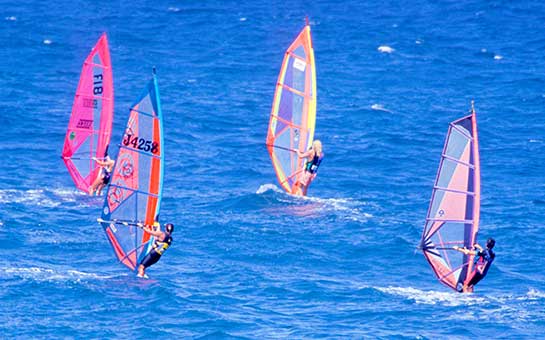Windsurfing is an extreme watersport that can best be described as a combination of sailing and surfing. Participants ride what amounts to a surfboard with a sail on it—catching the wind gives riders a boost of both speed and airtime, increasing both the thrill and the ability to perform tricks. As with any hazardous sport, windsurfing can be somewhat risky, and unexpected injuries and accidents are always possible. Don’t let fear of medical expenses deter you from trying this exhilarating experience. If you’re taking a beach vacation and want to give it a go, purchase travel insurance for windsurfing for complete peace of mind.
Travel Insurance for Windsurfing
Any time you travel, you should consider purchasing travel insurance. However, most general travel insurance plans don’t cover the risks associated with hazardous or extreme sports. If you think you might go windsurfing while on vacation, look for a hazardous sports travel insurance plan that covers windsurfing to give yourself that extra layer of protection in case anything goes awry.
Needing medical attention away from home and during vacation is bad news. It ruins your plans for a relaxing or invigorating getaway, and on top of that, medical treatment in a foreign country can be expensive. Windsurfing travel insurance will help ease the financial blow of a hospital visit (or even an extended stay) while recuperating.
Make sure your windsurfing travel insurance policy also includes benefits like your evacuation from the accident area to a hospital and repatriation to your home country. Along with your medical expenses, your windsurfing travel insurance may offer additional coverage for incidents such as lost baggage, a lost passport, trip cancellation, and more.
Once you have finalized your travel destination and decided to give windsurfing a try, compare and shop carefully for good windsurfing travel insurance plan that will keep you covered should the worst occur.
Basics of Windsurfing
Windsurfing is also known as “sailboarding” or “boardsailing”, and participants are commonly called “sailors” or “board heads”.
The main equipment required is a 6.5- to 13-foot (2- to 4-meter) longboard with an attached sail. Along with the sail, there is a mast and a boom attached to the board by a free-rotating joint. Proper weather conditions are also needed; the ideal windspeed for windsurfing is between 15–25 knots.
As a first-timer, you can learn the basic skills—sailing, turning, and steering—within a few hours. If you are interested, you can learn more advanced skills like planing, water-starting, and jumping. But the good news is that all you really need to know are the basics in order to have a good time.
Risks of Windsurfing
Your holiday windsurfing club or trip organizer will tell you the importance of the right gear in reducing risks while windsurfing. You must wear the appropriate suit, helmet, gloves, and special sunglasses. You should also use special rubber-soled windsurfing shoes and a personal flotation device (life jacket).
Risks in windsurfing can crop up for many reasons: your physical condition, preparedness, water currents, obstacles, entrapment, and marine life. Other issues that pose a problem are inexperience, poor technique, poorly maintained equipment, some advanced maneuvers like jumping, or falls.
Common windsurfing-related injuries include:
- Direct impact injuries
- Back injuries
- Bone fractures
- Joint sprains
- Dislocated shoulders
- Muscle tears
- Skin damage
- Hypothermia
- Drowning
Serious injuries will require medical treatment and a long recovery period. If you’re in a foreign country, this type of care potentially poses some major financial problems. To mitigate this risk, you can get windsurfing travel insurance before you set out on your trip.
